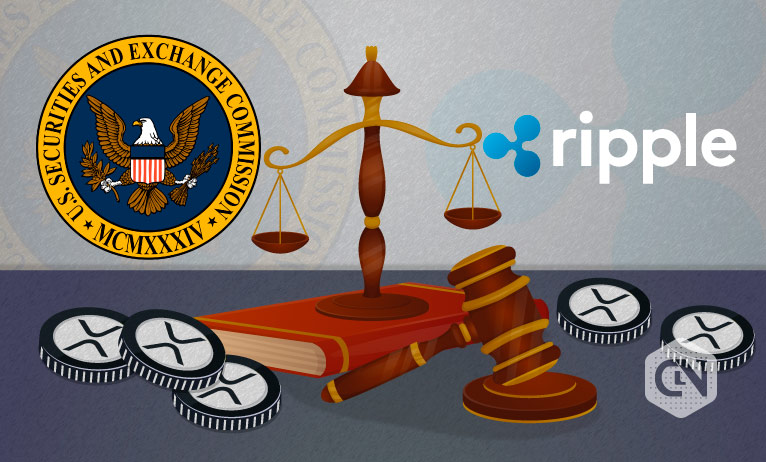XRP Classification As Commodity: Latest News On Ripple SEC Lawsuit Settlement

Table of Contents
The SEC's Case Against Ripple
The SEC's case against Ripple centers on allegations of unregistered securities offerings. They argue that Ripple's sales of XRP violated federal securities laws.
Allegations of Unregistered Securities Offerings
The SEC's primary argument relies heavily on the "Howey Test," a legal framework used to determine whether an investment contract constitutes a security. This test considers four elements: an investment of money, in a common enterprise, with an expectation of profits, solely from the efforts of others. The SEC alleges that Ripple's sales of XRP met all four criteria, pointing to:
- Programmatic sales of XRP: The SEC highlighted Ripple's large-scale sales of XRP to institutional investors and the general public, arguing this constituted an ongoing offering of securities.
- Ripple's control over XRP: The SEC emphasized Ripple's influence on XRP's development and market, suggesting centralized control inconsistent with a decentralized digital asset.
- Investor expectation of profits: The SEC claimed investors purchased XRP anticipating profits driven by Ripple's efforts in developing and promoting the cryptocurrency.
- Impact on XRP Investors: The SEC’s lawsuit created significant uncertainty for XRP investors, impacting trading volumes and market prices, and potentially leading to legal ramifications for those involved in the transactions.
Ripple's Defense Strategy
Ripple vehemently denies the SEC's allegations, arguing that XRP is a decentralized digital asset and not a security. Their defense strategy rests on several key points:
- Decentralized nature of XRP: Ripple emphasizes XRP's independent operation outside of Ripple's direct control, highlighting its use in various payment networks and its widespread adoption.
- Functional utility of XRP: They underscore XRP's practical applications as a bridge currency for cross-border payments, highlighting its role in facilitating transactions within its ecosystem.
- Lack of centralized control: Ripple argues that its influence on XRP is minimal compared to truly centralized assets, emphasizing the distributed nature of the ledger and the involvement of numerous independent validators.
- Legal precedents: Ripple's legal team has cited various legal precedents and expert testimonies to support their argument that XRP doesn't fit the definition of a security under the Howey Test.
Recent Developments and Court Proceedings
The Ripple-SEC lawsuit has seen significant developments and court proceedings.
Key Rulings and Judge's Opinions
The case has witnessed several key rulings, including partial victories for both sides. Judge Analisa Torres's decisions have been particularly pivotal, offering insights into the legal arguments and shaping the future trajectory of the case.
- Key Dates: Specific dates of significant rulings and filings should be included here for up-to-date information.
- Judge's Statements: Analysis of the judge's statements on key aspects of the case, including their interpretation of the Howey Test and the evidence presented.
- Motions: Details on any motions granted or denied, such as motions to dismiss or for summary judgment, and their impact on the case's progression.
Potential Settlement Negotiations
While both sides have engaged in protracted legal battles, the possibility of a settlement remains. A settlement could significantly impact XRP's classification and the broader crypto market.
- Benefits and Drawbacks of Settlement: Analysis of the advantages and disadvantages of a settlement for Ripple and the SEC, including reputational impacts and potential financial consequences.
- Potential Settlement Terms: Speculation on potential terms of a settlement, considering the legal arguments and the financial implications for each party.
- Impact on the Crypto Market: Assessment of how a settlement could influence regulatory clarity and the overall sentiment toward cryptocurrencies.
Implications of XRP Classification
The final classification of XRP—as a security or a commodity—will have far-reaching consequences.
Impact on XRP Price and Trading
The classification of XRP significantly impacts its price volatility and trading volumes.
- Regulatory Uncertainty: Regulatory uncertainty affects investor confidence and market liquidity, causing price fluctuations and potentially limiting access to trading platforms.
- Exchange Listings: Exchanges may delist or relist XRP based on the final ruling, affecting accessibility for traders and investors.
- Investor Sentiment: Investor sentiment is highly sensitive to regulatory changes, directly influencing demand and thus the price of XRP.
Broader Implications for the Cryptocurrency Market
The Ripple case sets a precedent for future SEC actions and the broader regulatory landscape for cryptocurrencies.
- SEC's Approach to Crypto Regulation: The outcome will influence how the SEC approaches the regulation of other cryptocurrencies and digital assets.
- Regulatory Clarity: The ruling could increase regulatory clarity or perpetuate uncertainty in the crypto market, depending on the final classification and subsequent legal interpretations.
- Innovation and Development: The legal outcome could affect the pace of innovation and development in the cryptocurrency space, potentially chilling or encouraging further advancements.
Conclusion
The Ripple SEC lawsuit concerning the classification of XRP as a security or a commodity is a landmark case with profound implications for the cryptocurrency market. The outcome will significantly impact XRP's price, trading, and the regulatory landscape surrounding digital assets. The ongoing debate highlights the complex legal challenges involved in defining and regulating cryptocurrencies. Understanding the potential for XRP commodity classification is essential for navigating this evolving space.
Call to Action: Stay informed about the latest developments in the Ripple SEC lawsuit and the ongoing debate surrounding XRP's classification. Continue to research and understand the implications of this landmark case for your investment strategies and your understanding of the evolving cryptocurrency market. Follow reputable news sources for updates on the XRP commodity classification and its future.

Featured Posts
-
 Sony Play Station Beta Program What We Know So Far
May 02, 2025
Sony Play Station Beta Program What We Know So Far
May 02, 2025 -
 Mastering The Art Of Crab Stuffed Shrimp In Lobster Sauce
May 02, 2025
Mastering The Art Of Crab Stuffed Shrimp In Lobster Sauce
May 02, 2025 -
 School And Trash Service Changes Due To Fridays Snow And Ice
May 02, 2025
School And Trash Service Changes Due To Fridays Snow And Ice
May 02, 2025 -
 Reporting Storm Damage In Tulsa Assisting The National Weather Service
May 02, 2025
Reporting Storm Damage In Tulsa Assisting The National Weather Service
May 02, 2025 -
 Bbc Two Hd Tv Guide Newsround Listings
May 02, 2025
Bbc Two Hd Tv Guide Newsround Listings
May 02, 2025
Latest Posts
-
 Could Boris Johnsons Comeback Save The Tories
May 03, 2025
Could Boris Johnsons Comeback Save The Tories
May 03, 2025 -
 Alan Rodens Contributions To The Spectator A Critical Analysis
May 03, 2025
Alan Rodens Contributions To The Spectator A Critical Analysis
May 03, 2025 -
 Boris Johnsons Return A Lifeline For The Conservative Party
May 03, 2025
Boris Johnsons Return A Lifeline For The Conservative Party
May 03, 2025 -
 Alan Roden A Profile Of The Spectators Author
May 03, 2025
Alan Roden A Profile Of The Spectators Author
May 03, 2025 -
 Political Analysis Is The Nasty Party Label Sticking To Labour
May 03, 2025
Political Analysis Is The Nasty Party Label Sticking To Labour
May 03, 2025
